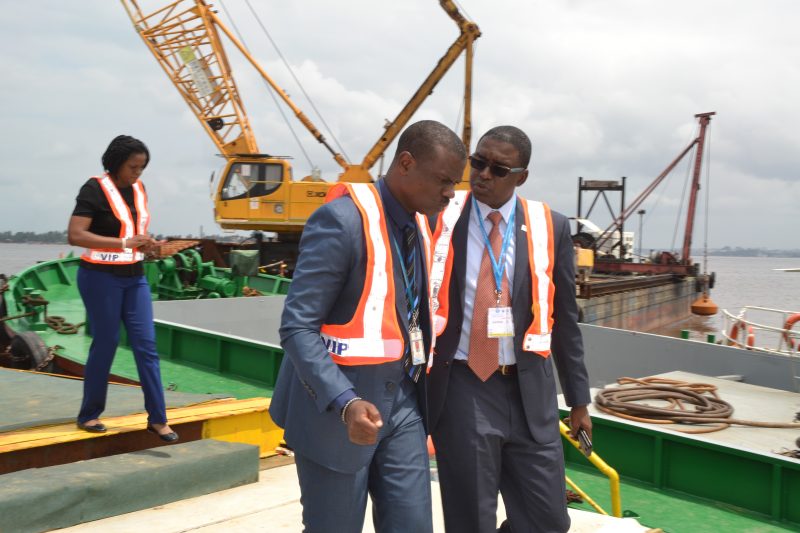
MCA - Cote d'Ivoire
ACEO Mahmoud Bah (right) at the Port of Abidjan where MCC is rehabilitating critical roadways to ease congestion and support the port’s growth as part of the MCC – Cote d’Ivoire Compact.
While addressing the 2021 African Union Summit earlier this year, President Biden called on the United States to work together with African nations “to advance our shared vision of a better future.” At MCC, we are doing just that.
Since the agency’s founding in 2004, MCC has invested more than $9 billion in grant funding across 23 countries in Africa. MCC’s programs—designed and implemented in partnership with the countries themselves—tackle constraints to economic growth and include work with governments to address policy and institutional reforms that are responsive to the needs of their citizens. Together with partner countries, we have built and upgraded roads, increased access to reliable and affordable electricity, supported agriculture and irrigation, and provided people with greater access to clean water, education, and healthcare services.
MCC is continuing to innovate for the benefit of our partners. On May 17, MCC signed a cooperative agreement with the West African Power Pool (WAPP), a cooperation of the national electricity companies in West Africa under the auspices of the Economic Community of West African States (ECOWAS). For MCC this is a first-of-its kind agreement with a regional institution and will allow the agency to leverage the expertise, broad network and knowledge of the WAPP as we work on a potential regional program to connect the power sectors of Burkina Faso and Côte d’Ivoire.
The ability to support cross-border regional programs like this is relatively new for MCC and recognizes the importance of regional integration. If successful, this potential regional program could expand electricity access in both countries and improve a key economic constraint in the region—the lack of access to reliable and affordable power.
As the Acting CEO of MCC and a naturalized American who was born and raised in Africa, my commitment is both professional and personal. Traveling across the continent, the talent, ambition, and the energy of African youth is undeniable. It is clear that Africa is on the cusp of transformative growth, with the digital transformation as one powerful example. At the same time, the COVID-19 pandemic has reversed years of progress across key systems; climate change and extreme weather volatility are contributing to violent conflicts, increases in food insecurity, malnutrition and health challenges, and threatening the livelihoods of an entire generation. Moreover, economic growth and access to innovative financial tools remain unequal, marginalizing women, the key engine of the African socio-economic fabric.
As the Acting CEO of MCC and a naturalized American who was born and raised in Africa, my commitment is both professional and personal. —Mahmoud Bah, Acting CEO of MCCA robust, African-led COVID-19 recovery plan that is endorsed by key international development and African regional institutions is critical to overcoming the challenges facing Africa. This is urgent work, and although recent IMF data shows that African economies contracted by an average of 2.6 percent in 2020 for the first time in 25 years and forecasts show growth on the continent will be slower than the global average, it remains imperative that tackling these challenges will require steadfast commitment and accountability, both within the continent and from external partners.
MCC is well-positioned to accompany partner countries as they get back on their feet. MCC’s investments in infrastructure—combined with the agency’s ability to leverage investments to press for policy and institutional reforms that unlock private sector opportunities—will continue to be essential for kick-starting economic growth in partner countries.
I continue to be inspired by the commitment and hard work of MCC partner countries. I thank the staff of the MCC accountable entities, MCC staff in the field, as well as our partners from government, the private sector and civil society. Africa Day is a wonderful reminder of the importance of unity and solidarity—within societies at the national level, across countries on the continent, and with the international community. It is only through a collaborative approach that we will achieve a sustainable and inclusive recovery from COVID-19. As an American with African roots, I believe that, together, we can build a brighter future for Africa and its people.

